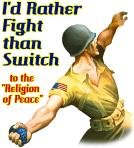
A consensus Muslim account of the massacre of the Qurayzah has emerged as converyed by classical Muslim scholars of hadith (putative utterances and acts of Muhammad), recorded by pious Muslim transmitters), biographers of Muhammad’s life (especially Ibn Ishaq), jurists, and historians.[2]
This narrative is summarized as follows: Alleged to have aided the forces of Muhammad’s enemies in violation of a prior pact, the Qurayzah were subsequently isolated and besieged. Twice the Qurayzah made offers to surrender and depart from their stronghold, leaving behind their land and property. Initially they asked to take one camel load of possessions per person, but when Muhammad refused this request, the Qurayzah asked to be allowed to depart without any property, taking with them only their families. However, Muhammad insisted that the Qurayzah surrender unconditionally and subject themselves to his judgment.
Compelled to surrender, the Qurayzah were led to Medina. The men, with their hands pinioned behind their backs, were put in a court, while the women and children were said to have been put into a separate court. A third (and final) appeal for leniency for the Qurayzah was made to Muhammad by their tribal allies the Aus. Muhammad again declined, and instead he appointed as arbiter Sa’d Mu’adh from the Aus, who soon rendered his concise verdict: The men were to be put to death, the women and children sold into slavery, the spoils to be divided among the Muslims.
Muhammad ratified the judgment stating that Sa’d’s decree was a decree of God pronounced from above the Seven Heavens. Thus some six hundred to nine hundred men from the Qurayzah were led on Muhammad’s order to the Market of Medina. Trenches were dug, and the men were beheaded; their decapitated corpses were buried in the trenches while Muhammad watched. Male youths who had not reached puberty were spared. Women and children were sold into slavery, a number of them being distributed as gifts among Muhammad’s companions. According to Muhammad’s biographer Ibn Ishaq, Muhammad chose one of the Qurayzah women (Rayhana) for himself. The Qurahzah’s property and other possessions (including weapons) were also divided up as additional ‘booty’ among the Muslims.
The following details have been chronicled consistently by Muslim sources: The arbiter (Sa’d Mu’adh) was appointed by Muhammad himself; Muhammad observed in person the horrific executions; Muhammad claimed as a wife a woman (Rayhana) previously married to one of the slaughtered Qurayzah tribesmen; the substantial material benefits (i.e. property, receipts from the sale of the enslaved) that accrued to the Muslims as a result of the massacre; the extinction of the Qurayzah.
Entire article here.
This narrative is summarized as follows: Alleged to have aided the forces of Muhammad’s enemies in violation of a prior pact, the Qurayzah were subsequently isolated and besieged. Twice the Qurayzah made offers to surrender and depart from their stronghold, leaving behind their land and property. Initially they asked to take one camel load of possessions per person, but when Muhammad refused this request, the Qurayzah asked to be allowed to depart without any property, taking with them only their families. However, Muhammad insisted that the Qurayzah surrender unconditionally and subject themselves to his judgment.
Compelled to surrender, the Qurayzah were led to Medina. The men, with their hands pinioned behind their backs, were put in a court, while the women and children were said to have been put into a separate court. A third (and final) appeal for leniency for the Qurayzah was made to Muhammad by their tribal allies the Aus. Muhammad again declined, and instead he appointed as arbiter Sa’d Mu’adh from the Aus, who soon rendered his concise verdict: The men were to be put to death, the women and children sold into slavery, the spoils to be divided among the Muslims.
Muhammad ratified the judgment stating that Sa’d’s decree was a decree of God pronounced from above the Seven Heavens. Thus some six hundred to nine hundred men from the Qurayzah were led on Muhammad’s order to the Market of Medina. Trenches were dug, and the men were beheaded; their decapitated corpses were buried in the trenches while Muhammad watched. Male youths who had not reached puberty were spared. Women and children were sold into slavery, a number of them being distributed as gifts among Muhammad’s companions. According to Muhammad’s biographer Ibn Ishaq, Muhammad chose one of the Qurayzah women (Rayhana) for himself. The Qurahzah’s property and other possessions (including weapons) were also divided up as additional ‘booty’ among the Muslims.
The following details have been chronicled consistently by Muslim sources: The arbiter (Sa’d Mu’adh) was appointed by Muhammad himself; Muhammad observed in person the horrific executions; Muhammad claimed as a wife a woman (Rayhana) previously married to one of the slaughtered Qurayzah tribesmen; the substantial material benefits (i.e. property, receipts from the sale of the enslaved) that accrued to the Muslims as a result of the massacre; the extinction of the Qurayzah.
Entire article here.














No comments:
Post a Comment